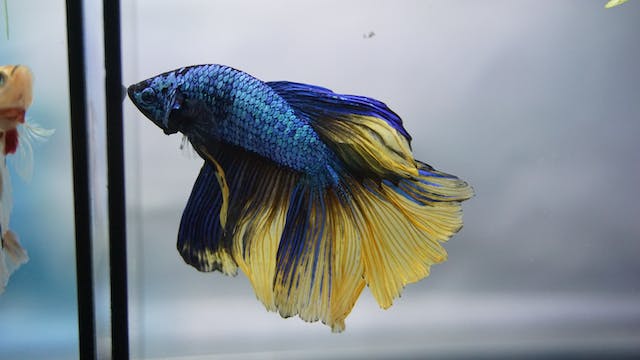
The Betta Fish is a common pet in many American households, hotels, chambers, etc. People use many different water types to keep and grow the Betta Fish. Is the tap water suitable for Betta Fish? How long can a Betta fish live in tap water anyway? This is precisely what we are going to answer in today’s blog.
How Long Can a Betta Fish Live In Tap Water?
The Betta fish requires gentle freshwater with suitable minerals for survival. There are several reasons why better fish should not be kept in untreated tap water.
In many parts of the world, including several areas in the USA, tap water has become too salty and contains many heavy salts of iron, calcium, and magnesium.
Dissolved salts in tap water can slowly cause chemical burns in the gills and heart of the fish. This causes tissue rotting and eventual death.
Most of the time, this death can occur within 6 to 12 hours of leaving the Betta fish in untreated tap water.
It should be noted, however, that as long as the Betta fish is provided with treated tap water that has adequately removed the salts, chlorine, and metals, your face should be okay.
Is Tap Water Dangerous for Betta Fish and Why?
We discussed heavy salts burning the beautiful Betta fish when released in stagnant tap water. Let us understand these toxins and other toxins available in tap water to a better extent.
- High iron content: Tap water usually has a very high iron content as a mineral and a mineral salt. The guideline for iron in tap water in the USA is 1.0 milligrams per liter, which is too much for the Betta fish. This can cause elevated levels of iron, physical harm to the gills, random but rapid body deterioration, etc.
- Calcium and magnesium salts: Salts of calcium and magnesium act as slow toxins that can eventually shut down the metabolism of freshwater fish. Treating all water sources of calcium and magnesium salts is essential even before human consumption. Bottled water has the least amount of calcium and magnesium salts.
- Copper, lead, and nitrate metals: Minimal needs to be said about metal and metal oxides like copper, lead, and nitrate in tap water worldwide. It is a toxic heavy metal not only for freshwater fish but also for saltwater fish. It causes weight gain, white muscle deterioration, and immune system destruction.
- Chlorines and Chloramines: Chlorine can lead to restlessness, hyperactivity, suffocation, and even instant death.
- Large Toxins and Pollutants: Unbeknownst to human beings, several industrial pollutants and decomposing plastic matter can drain through the layers of soil and make their way into the groundwater. Treating tap water is, therefore, essential.
Read More: Can I Put a Spider Plant in My Betta Tank?
Symptoms of Tap Water Poisoning in Betta Fish

If you have already administered tap water in your Betta fish tanks, it will likely show specific symptoms within minutes. Here is what you should look out for.
- Necrosis of Gills: Necrosis means dead tissue cells. One of the earliest damage caused to fish because of toxins in the water is at the gills. Any blackening or tearing of gills should be a sign.
- Hypoxia: This condition refers to an animal body not having enough oxygen to sustain all body functions. This can be caused with or without gill necrosis. In this situation, body organs tend to shut down individually, eventually leading to brain death.
- Restlessness and frustration: Another early sign of tap water poisoning is restlessness and frustration. The simple cause for this might be the amount of discomfort the fish is currently facing.
- Loss of appetite: In the wild, fishes are mostly vicarious creatures who continue to eat even when full! So, if a fish refuses to eat, something must be wrong.
Top 5 Ways to Treat Tap Water for Betta Fish
This is a quick guide on how to treat tap water for the Betta fish quickly and economically.
- Use A Water Testing Kit: a water testing kit can easily be purchased from a pet store and applied to your chosen water source at home. It tells us the nature of a water source and the types of toxins stored in it.
- Dechlorination: This is an affordable yet essential process before introducing water to aquatic animals. You can do this by purchasing simple chemicals, or you can bring home a water dechlorinator instead.
- Sedimentation and Filtration: Leave the tap water overnight and let the large toxins settle at the bottom. Now, filter the water on top with filter paper, and your tap water should be ten times cleaner!
- Water Conditioner With Vitamin C: water conditioners are specially built machines that ensure tap water is high or oxygen and low on heavy salts or metals. For the Betta fish, it is best to add Vitamin C to the conditioning process.
- UV Light: UV light is a natural sterilizer that kills off microorganisms and other disease-causing elements by altering and mutating their DNA.
Final Thoughts
How long can a Betta fish live in tap water? In short, we saw in today’s article that while the beta fish can survive 6 to 12 hours in untreated tap water at most, this can have a lasting effect on the fish and be the cause of several respiratory and cardiovascular problems that the fish has. Treating tap water as soon as possible is an excellent initiative for people who want to raise their fish economically.
Frequently Asked Questions: How Long Can a Betta Fish Live In Tap Water?
Q1. Can Betta Fish live in tap water overnight?
Ans: Betta fish can live in tap water easily as long as it has been appropriately treated. For untreated tap water, the most a Betta fish can go is 6 to 12 hours, so there is no guarantee that it will survive the night.
Q2. What is the first step to treating tap water for Betta Fish?
Ans: The first step to treating tap water for better fish is using a water testing kit to determine the consistency of the tap water in terms of iron salts, calcium salts, magnesium salts, etc.
Q3. Can Betta Fish survive in salty water?
Ans: The Betta fish is a freshwater fish and cannot survive salt water. Most of the time, tap water in the cities is too salty for Betta fish.
Q4. Can Betta Fish live in distilled water?
Ans: Betta fish should never be left in distilled water because this is just as bad as salty water. Distilled water is stripped of any nutrients and can weaken the immunity of these fish.



